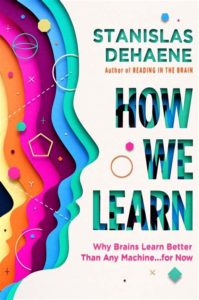

Dehaene contends that babies are not born as blank slates, which is important since learning requires possessing a model of the world. Further, they efficiently refine their naïve theories with experience. He reviews evidence showing that babies are born with evolutionarily programmed knowledge about, for example, the continuity of time and space, relative quantities, and the importance of faces. Additionally, learning (e.g., of language) starts in the womb.
Just as babies are born with theories about the world, they are born also with major brain structures are already in place. Still, brain development is experience dependent. Dehaene discusses “sensitive periods,” or periods of time when brain areas are especially plastic. Areas of the brain involved in supporting our senses lose plasticity first, while areas involved in our most complex cognitive functions remain plastic the longest. He argues that only extreme brain differences affect differences in cognition and that generally there is only minor variability among peoples’ brains. He shows also that there is never complete determinism from genes; experience and learning can significantly change the brain.
Our great ability to be learners has been key to human success. This ability, Dehaene suggests, is primarily built upon our ability to attend to our focus on what matters, our curiosity and ability to actively engage, our ability to correct our understanding in the face of mistakes, and our ability to consolidate or automate what we have learned. Attention involves selecting information on which to focus, amplifying that information, and tuning out other information. We are unlikely to learn things to which we do not attend, which is why it is so important for teachers to attend to students’ attention.
Information that is processed with greater depth will be more deeply understand and better remembered. As such, reducing passive learning, inspiring curiosity and question-asking, and creating structured opportunities to learn via discovery are important. Learning occurs when we are surprised and make mistakes. As such, mistakes should not be penalized, but rather the specific error should be quickly noted for the learner.
Testing, especially when spaced out frequently, can promote learning and retention by allowing mistakes to occur and be corrected frequently. When skills or knowledge transition from being slowly and consciously processed to quickly and automatically processed learning has occurred. That is, we must consolidate what we learn.
Sleep is key to consolidation. When sleeping we strengthen existing knowledge, and we record it in a more abstract way, which can allow for greater insight. Improving the length and quality of young people’s sleep is a powerful way to improve their learning.
Dehaene concludes by reminding his readers that people do not reach their full potential if their environment is not set-up to support them in doing so. As such, he offers several tips for supporting early learning. These include taking advantage of infants’ naïve intuitions, offering diverse, rich environments, attending to learner’s attention, promoting curiosity and effort, making learning feel fun and challenging, setting expectations and offering feedback, and sleeping. He suggests that the enterprise of education should be guided by interdisciplinary scientific research. For example, he calls for providing teachers with training in the science of learning to help them in their work. How We Learn is an expert scholar’s interesting dive into fundamental and important questions about learning.
Dehaene, S. (2020). How We Learn: Why Brains Learn Better Than Any Machine… for Now. Viking.




